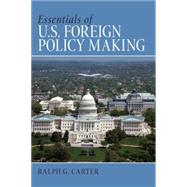Succinctly demonstrates the foreign policy making process
Essentials of U.S. Foreign Policy Making identifies the different actors who make U.S. foreign policy and how theories like realism, liberalism, idealism, and constructivism shape their actions in the post-9/11 era. It describes the process by which foreign policy decisions are made and helps readers assess which stages of the foreign policy process favor which actors.
NOTE: This is the standalone book.
MySearchLab is a part of the Carter program. Research and writing tools, including access to academic journals, help students understand critical thinking in even greater depth. To provide students with flexibility, students can download the eText to a tablet using the free Pearson eText app.
ALERT: Before you purchase, check with your instructor or review your course syllabus to ensure that you select the correct ISBN. Several versions of Pearson's MyLab & Mastering products exist for each title, including customized versions for individual schools, and registrations are not transferable. In addition, you may need a CourseID, provided by your instructor, to register for and use Pearson's MyLab & Mastering products.
Packages
Access codes for Pearson's MyLab & Mastering products may not be included when purchasing or renting from companies other than Pearson; check with the seller before completing your purchase.
Used or rental books
If you rent or purchase a used book with an access code, the access code may have been redeemed previously and you may have to purchase a new access code.
Access codes
Access codes that are purchased from sellers other than Pearson carry a higher risk of being either the wrong ISBN or a previously redeemed code. Check with the seller prior to purchase.








